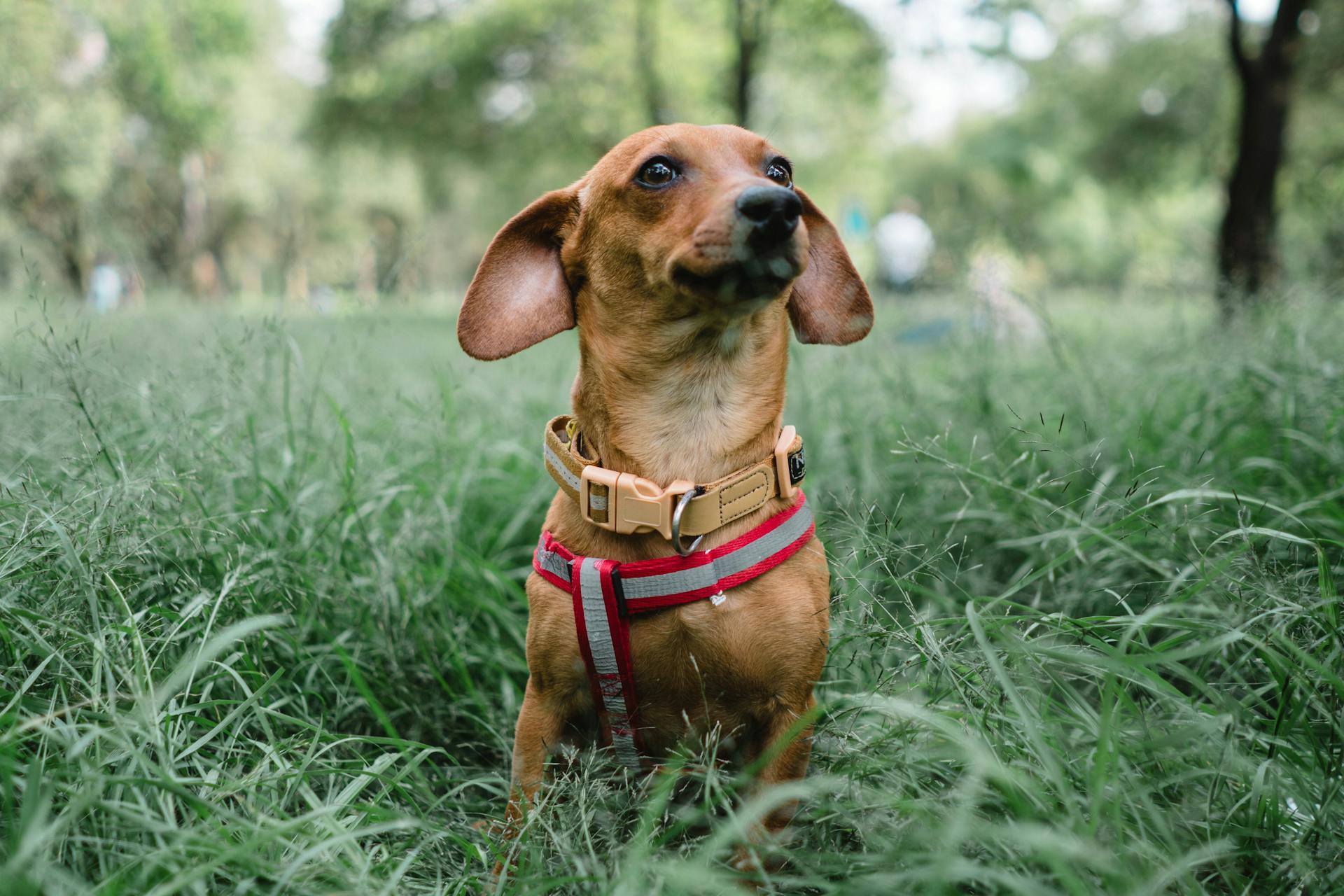
Cocker Spaniels are often stereotyped as aggressive dogs, but is this reputation really deserved? According to breed history, Cocker Spaniels were originally bred to hunt small game, which may have led to their reputation for being feisty.
However, this doesn't necessarily mean they're naturally aggressive. In fact, many Cocker Spaniel owners report that their dogs are friendly and outgoing.
Some Cocker Spaniels may develop aggression due to lack of socialization or proper training. This can be prevented by exposing your Cocker Spaniel to various environments and people from an early age.
Cocker Spaniels are also prone to certain health issues that can contribute to aggressive behavior, such as anxiety and pain. Regular veterinary check-ups and a balanced lifestyle can help mitigate these risks.
Check this out: Are Cocker Spaniels Good for Apartments
What Causes Aggression in Cocker Spaniels
Cocker Spaniels are considered one of the most aggressive dog breeds, with a study showing they ranked highest in aggression cases.
Researchers at the School of Veterinary Medicine at the Autonomous University of Barcelona found that English Cocker Spaniels are more likely to act aggressively towards their owners and strangers.
Cocker Spaniels with a golden coat color are also more aggressive, possibly due to the coat pigment sharing a biochemical pathway with dopamine and other brain chemicals that control aggressive behavior.
Males and show breed dogs are more likely to exhibit rage syndrome, a rare condition characterized by unexpected aggressive behavior.
The condition often shows itself during puppy months, typically around 8 months old.
In most cases, the responsibility for aggression falls on the owners who failed to train their dogs properly.
Researchers found that 40% of aggression in dogs is due to poor leadership and a lack of basic obedience training.
Here's a breakdown of the factors that contribute to aggression in Cocker Spaniels:
It's essential to find a reputable breeder who prioritizes temperament and checks the breeding pair's history to minimize the risk of aggression.
What Causes It?
Cocker Spaniel rage syndrome is a mysterious condition that's still not fully understood, but several theories have been put forward. Genetics may play a part in this condition.
Some believe it's an inherited genetic disorder, while others suggest it's a type of epilepsy or schizophrenia. The exact cause is still unknown.
Casual breeding is another theory, particularly from breeders who prioritize profit over the health and temperament of their dogs. However, many conscientious breeders exist who breed healthy puppies with sound temperaments.
Lack of early socialization is also a theory, but it's not the same as Cocker Spaniel rage syndrome. Fear-aggression can develop from inadequate socialization, but it's not the same as this rare condition.
Inexperienced owners can also contribute to aggressive behavior in their dogs, but it's not the same as Cocker Spaniel rage syndrome. A breakdown in the relationship between owner and pet can lead to aggression.
Here are some key facts about Cocker Spaniel rage syndrome:
Finding a good breeder who breeds on temperament and thoroughly checks the breeding pair's history is crucial. They should be expecting you to ask questions about their dogs and puppies, and they'll also want to know a lot about you.
Aggressive?
Cocker Spaniels are not inherently aggressive, but like any breed, individual dogs can develop behavioral issues due to various reasons.
Consistent training and early socialization are key to preventing aggressive tendencies in Cocker Spaniels. Ensuring your Cocker Spaniel has positive interactions with various people, pets, and environments during their formative months can help prevent aggressive tendencies.
The majority of aggression in Cocker Spaniels is actually caused by poor leadership on the part of the owners who failed to train their dogs properly.
Research shows that 40% of the aggression in dogs is due to a lack of basic obedience training and poor leadership from owners.
Cocker Spaniels may be prone to some aggression issues due to genetic and environmental factors, especially if they are bred without consideration for temperament.
Individual dogs can develop behavioral issues due to various reasons, including lack of training, negative experiences, or genetics.
Suggestion: English Cocker Spaniel Health Problems
Diagnosing and Treating Aggression
If your Cocker Spaniel shows signs of aggressive behavior, it's likely due to another form of aggression, not Cocker rage. This could be dominance aggression, resource guarding, or territorial behaviors.
Resource guarding, for example, may cause your dog to become aggressive when someone approaches their food bowl while eating. It's essential to rule out these common causes of aggression before considering Cocker rage.
Don't try to diagnose your dog's aggression without consulting a vet, as severe cases are often misdiagnosed by owners, leading to unnecessary euthanasia. Your vet may diagnose Cocker rage, refer you to a specialist, or confirm that the issue is a training problem.
Diagnosing Syndrome
Cocker rage is a rare condition, so it's essential to rule out other forms of aggression first.
If your dog shows signs of aggressive behaviour, it's more likely to be another form of aggression, not Cocker rage.
Don't try to diagnose aggressive dog behaviour without referring it to your vet.
Severe cases of aggression in dogs are often incorrectly diagnosed (by owners) as rage syndrome.
To get an accurate diagnosis, visit your vet and provide a note of all the symptoms and events that lead you to believe your dog's aggression is Cocker rage.
Listing everything that happened before, during, and after an alleged rage episode will give your vet a better understanding.
It would be even better to get it on video, but that may not be easy.
Treatment for Dogs
Treatment for dogs with aggression can be challenging, and it's essential to work closely with a veterinarian to find the right approach.
In some cases, medication such as anti-epileptics may be prescribed to help manage the condition.
Unfortunately, every dog responds differently to treatment, and medication may not be effective for all dogs.
Careful breeding by responsible breeders is also crucial in reducing the occurrence of aggression in certain breeds.
Cases of rage syndrome in Cocker Spaniels are extremely rare, and the breed's temperament is generally very gentle and loving.
Dogs with aggression issues may require a tailored approach to treatment, and it's crucial to work with a veterinarian to find the right solution.
Medication may not be the only option, and other methods such as training and behavioral modification may be necessary to address aggression in dogs.
Responsible breeding practices can help reduce the occurrence of aggression in certain breeds, making them better companions for families.
Take a look at this: English Springer Spaniel Weight
Preventing Aggression in Cocker Spaniels
Cocker Spaniels are generally not aggressive, but with proper care and attention, you can prevent aggression in your Cocker Spaniel. Consistent training and early socialization are key to preventing aggressive tendencies. This means getting your Cocker Spaniel out of the house and around other dogs and humans from an early age.
Socialization is crucial in the formative months of a Cocker Spaniel's life. Positive interactions with various people, pets, and environments can help prevent aggressive behaviors. Stability and predictability in their environment can also help prevent anxiety-driven behaviors.
Regular exercise and mental stimulation are also essential to prevent destructive behaviors. A bored Cocker Spaniel can develop behavioral issues, including aggression. By providing regular exercise and mental challenges, you can keep your Cocker Spaniel engaged and content.
Here are some essential tips to prevent aggression in Cocker Spaniels:
- Buy from a reputable breeder to ensure a healthy Cocker with an excellent temperament.
- Begin socializing your puppy as soon as you bring him home to ensure a confident, well-mannered puppy.
- Use positive reinforcement methods, such as treats and praise, to train your Cocker Spaniel.
- Provide regular exercise and mental stimulation to keep your Cocker Spaniel engaged and content.
Preventing Syndrome
Cocker rage syndrome is not a common condition, but it's essential to understand the factors that contribute to it. It's often misunderstood as a distinct syndrome, when in fact, many cases are simply a result of poor training, behavior, or health issues.
To get a Cocker Spaniel with a great temperament, it's crucial to buy from a reputable breeder. Reputable breeders prioritize the health and well-being of their dogs, which is reflected in the puppies they produce.
Puppy farms, also known as puppy mills, churn out puppies by the hundreds, often with disastrous consequences for the dogs' health and behavior. You can avoid these problems by choosing a responsible breeder.
Socialization is key to developing a confident, well-mannered puppy. Start socializing your Cocker Spaniel as soon as you bring him home to ensure he grows into a well-balanced adult dog.
Cocker Spaniels can be sensitive, so gentle but firm handling is essential. Avoid shouting or rough handling, as this can exacerbate any underlying issues.
Socialization and training from an early age can prevent aggression in Cocker Spaniels. Get your puppy out of the house and around other dogs and humans to teach them how to act appropriately.
For your interest: Common Health Problems for Cocker Spaniels
Preventing Dog Aggression
Cocker rage syndrome is extremely rare in Cocker Spaniels, and most cases of aggression are actually due to poor training or behavior.
Buying from a reputable breeder is crucial to getting a healthy Cocker with a good temperament. Avoid puppy farms and pet shops, as these places churn out puppies without proper care and often lead to health and behavioral problems.
Socialization is key to preventing aggression in Cocker Spaniels. Start socializing your puppy as soon as you bring him home to ensure he develops into a confident, well-mannered adult dog.
Consistent training and positive reinforcement are essential for shaping a Cocker Spaniel's behavior. Harsh training can have detrimental effects on their psyche, leading to fearful or defensive behaviors.
A stable environment is vital for preventing anxiety-driven behaviors in Cocker Spaniels. Provide a predictable routine, regular exercise, and mental stimulation to keep your Cocker engaged and content.
Here are some tips for preventing aggression in Cocker Spaniels:
- Treat your Cocker gently and avoid shouting at him, as Cocker Spaniels can be sensitive.
- Ensure your Cocker Spaniel has positive interactions with various people, pets, and environments during their formative months.
- Provide regular exercise and mental challenges to keep your Cocker engaged and content.
- Use positive reinforcement methods when training your Cocker Spaniel, as they respond best to this type of training.
- Establish a consistent training routine to help your Cocker Spaniel understand boundaries and behavioral expectations.
Frequently Asked Questions
How do I get my English cocker spaniel to stop biting?
Redirect your puppy's biting behavior by associating it with a clear 'no' signal, such as crossing your arms, and then redirecting to a toy. Consistency and positive reinforcement will help your English cocker spaniel learn what is and isn't acceptable behavior
What is possession aggression in cocker spaniels?
Possession aggression in cocker spaniels is a behavior where a dog growls, snaps, or bites to protect a perceived resource, such as food, toys, or space. This aggressive behavior is an attempt to prevent others from accessing or taking away the resource.
Sources
- https://www.about-cocker-spaniels.com/cocker-spaniel-rage.html
- https://dogstodaymagazine.co.uk/2023/07/21/the-persistent-myth-of-cocker-rage/
- https://www.dogster.com/dog-breeds/how-aggressive-are-cocker-spaniels
- https://iheartdogs.com/are-cocker-spaniels-aggressive/
- https://www.hepper.com/are-cocker-spaniels-aggressive/
Featured Images: pexels.com


